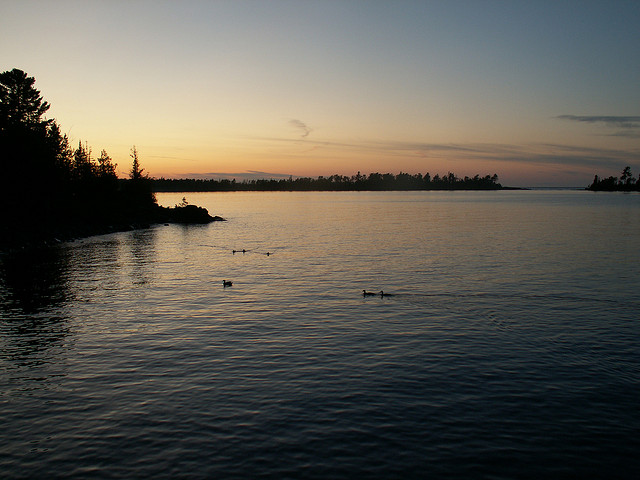In examining U.P.'s issues, Native Americans weigh in
Sometimes I get disappointed in Yoopers when they refuse to discuss the problems we have in the area, wanting to pretend there are none. I’d much rather address them and start the discussion about solutions.
When I think of issues that need discussion, Native Americans quickly come to the top of the list as they are so central to U.P. identity. So I asked some Native American writers I know this question: What is the biggest concern currently facing the people of the U.P.?
Kenn Pitawanakwat: A young Anishinaabe male here in the U.P. sent me this message recently over social media:
Kenn, my tribe is terrible to its members. It is driving me away from my culture by perpetuating almost every negative stereotype. Do you have any advice for me? I don't want to lose my Native spirituality that I've developed over the years, but they just keep beating the ‘nish pride out of me. They don't practice hardly any of the culture and none speak the language, they just try to make life difficult for each other, especially the ones in the leadership positions.
My response: Colonial cancers of shame and imposition must be extricated from Anishinaabe America. The membership must supplant these tumors with inherent cultural pride and robust articulation—preferably in the language and spirit of its ancestors. Show dignity. Tell identity. Promote Anishinaabe health.
Brenda Austin: The biggest concerns for Native and non-Native populations in the Upper Peninsula are environmental health and sustainability issues. The Great Lakes are being inundated by invasive species in our aquatic ecosystems, plant and animal diseases are increasing, and there are water quality issues from the impact of coal-fired power plants and nickel and sulfide mining. We rely on Canada to use best water practices, wetlands are polluted and disappearing, important predators (such as wolves) are being hunted, which could be a source of better health for our deer populations.
Politics and economy need to balance harmoniously within the needs of our environment; we are defined by our relationships to our lands and waters. What will our legacy to the seventh generation be?
April E. Lindala: Who takes time to think about their environment surroundings in a pre-colonial context, void of cars, technology and permanent living structures? Michigan’s Upper Peninsula is a part of the traditional homelands of the Anishinaabeg nation. What language was spoken by those who walked upon the earth prior to European contact?
The Anishinaabe language is a language of relationships: person-to-person, people to all living beings and the environment. The moon of June is known as the strawberry moon or ode’miin giizis (heart berry moon). This is the time to gather strawberries, but there are stories about the strawberry beyond its purpose as a food. The Anishinaabe language must be revitalized not only to protect a way of communicating, but also a way of thinking.
Martin Reinhardt: The biggest concern is what people believe, or don’t believe, about the impact of human activity on the world around us. For instance, some believe that mining can be done safely, or that fracking is necessary to gain energy independence. Despite the evidence that exists about the catastrophic aftermath of chemical spills and water contamination, many choose to bury their head in the sand and focus on the economic prosperity that is promised as a result of the industrial exploitation of natural resources in the Upper Peninsula.
My Anishinaabe Ojibway ancestors who lived here prior to colonization would probably not recognize the UP if they saw it today, and they certainly would not approve of how we as humans are treating our Mother the Earth.
Shirley Brozzo: The biggest issue concerning Native Americans in the Upper Peninsula is reversing the effects of boarding schools. We need to relearn and revitalize our language that was beaten out of us so that we can continue ceremonies and traditions that rely on words or concepts only described in our native tongue. Our people need to embrace self-worth, not to be boastful, but to value our own lives and accomplishments.
Education will improve our lot, so we must find a way to learn all that we can, not only through schools and universities, but also in life-skills so we can find employment to support our families. All of these changes must reach a balance between obligations to our self, our families, our culture, and our creator.
See what new members are saying about why they donated to Bridge Michigan:
- “In order for this information to be accurate and unbiased it must be underwritten by its readers, not by special interests.” - Larry S.
- “Not many other media sources report on the topics Bridge does.” - Susan B.
- “Your journalism is outstanding and rare these days.” - Mark S.
If you want to ensure the future of nonpartisan, nonprofit Michigan journalism, please become a member today. You, too, will be asked why you donated and maybe we'll feature your quote next time!


 TIME TO TALK: Amidst the Upper Peninsula's beauty lie problems bedeviling its Native American population. (Photo by Flickr user rosefirerising; used under Creative Commons license)
TIME TO TALK: Amidst the Upper Peninsula's beauty lie problems bedeviling its Native American population. (Photo by Flickr user rosefirerising; used under Creative Commons license)